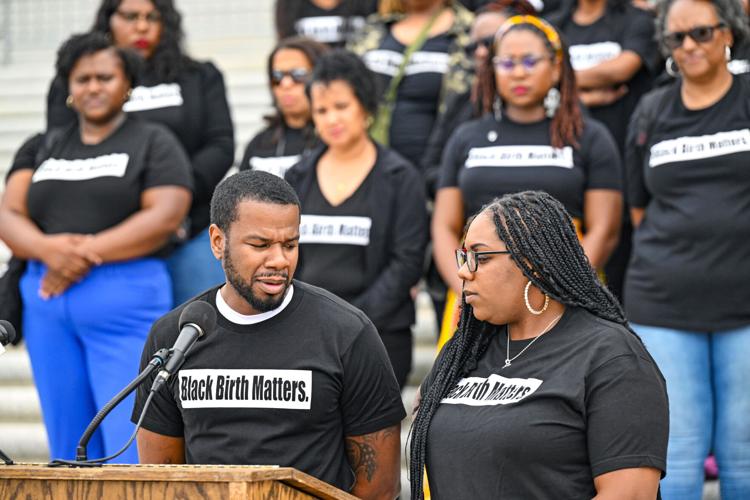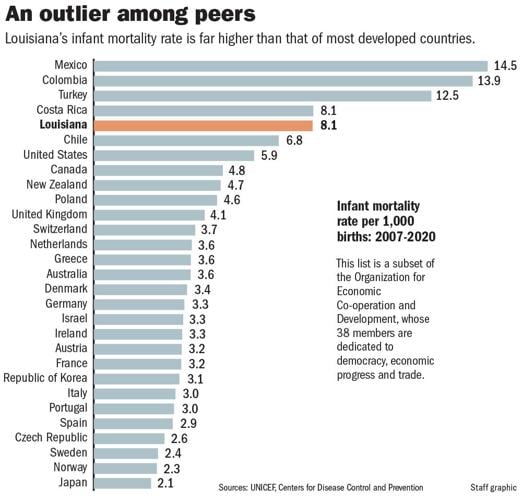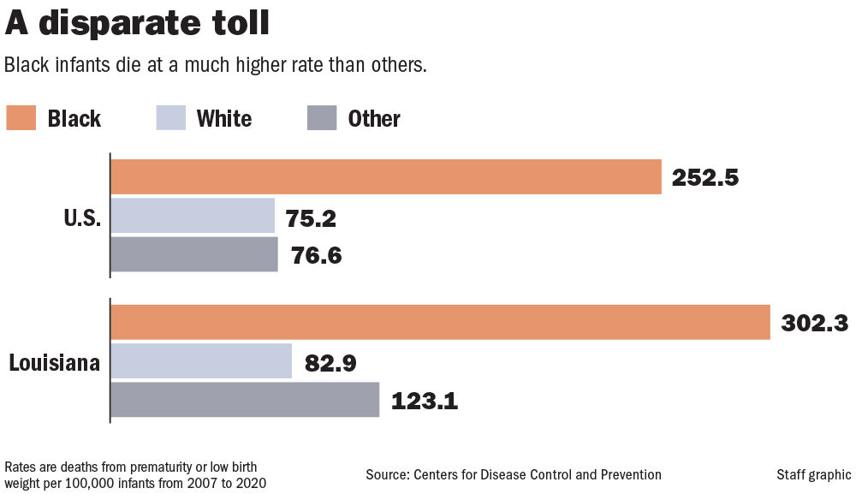With newborn babies and their moms dying in Louisiana at some of the highest rates in the developed world, lawmakers are considering bills that would expand health care services to pregnant women and newborns while also increasing payment to their providers.
Louisiana’s infants are 65% more likely to die from being born too early or too small than babies across the rest of the country, according to The Times-Picayune | The Advocate’s analysis of federal data. The state could have seen 458 fewer infant deaths in the decade before the pandemic if its rates of preterm birth and low birth weight mirrored the national average.
The slate of bills at the Legislature would ensure newborn home visits for families on Medicaid and require insurers to pay for remote monitoring to allow patients to send in blood pressure and vital signs from home between appointments.

Other legislation would increase payments to physicians who provide obstetric and gynecological care to Medicaid patients. And lawmakers are also considering whether to require Medicaid to cover doula care for physical and emotional support during pregnancy.
“The research is there: Our moms are dying, our babies are dying, you see the cost,” said Frankie Robertson, a consultant with the Amandla Group who represents several maternal health groups. “We’re not asking for more money; we’re asking for the budget to be redistributed to save lives.”
Many of the proposals have gotten a friendly reception so far in committee hearings, but some lawmakers have also expressed concern over costs. Meanwhile, many lawmakers are backing bills this session for “educational savings accounts” that have cost hundreds of millions of dollars in other states, while lawmakers recently approved a bevy of criminal justice bills projected to cost the state at least $32 million.
Susan East Nelson, executive director of Louisiana Partnership for Children and Families, said the state creates far more expensive problems when it does not invest in well-being for families. Better-supported children are less likely to wind up in foster care or the criminal justice system, she said.
“This investment is actually going to save us money in other places,” Nelson said about House Bill 860 from state Rep. Michael Echols, R-Monroe.

Dr. Victoria Williams records a video of a group of advocates and herself saying “black birth matters” during a Black Maternal Health Advocacy Day press conference on the steps of the state capitol on April 17, 2024.
The legislation would require Medicaid to cover home visits for newborns, which are proven to help reduce infant mortality.
Louisiana’s programs currently reach only 10% of newborns on Medicaid, according to the Louisiana Policy Institute for Children. State officials are still trying to determine how much Echols’ bill would cost; Nelson said other states spend from $140 to $750 per family.
Using Medicaid to pay for home visits is the norm in many other states, she said, including Arkansas and Alabama.
Bills would expand access to nutritional counseling, breast pumps
New data on pregnancy-related deaths in Louisiana show the top factors in maternal deaths in 2020 were cardiomyopathy, cardiovascular conditions and infections. Among all women who died during pregnancy or within a year of giving birth in 2020, overdose was the top cause.
“Access [to health care] is one of the biggest factors,” said Dr. Veronica Gillispie-Bell, an OB-GYN and the medical director of the state’s Pregnancy Associated Mortality Review.

Gillispie-Bell testified about House Bill 489 from state Rep. Jason Hughes, D-New Orleans, which would require both insurance and Medicaid to cover earlier nutritional counseling for pregnant patients. They usually cannot qualify unless they’re diagnosed with gestational diabetes.
By then, health care providers say it’s too late. Obesity and abnormal weight gain during pregnancy are linked with bad outcomes, said Dr. Terrie Thomas, an OB-GYN at Woman’s Hospital.
“Nutrition is so very important for pregnancy,” Thomas said.
State Sen. Royce Duplessis, D-New Orleans, is carrying a similar bill through the Senate side of the chamber, Senate Bill 300.

Royce Duplessis, D-5, speaks during a Black Maternal Health Advocacy Day press conference on the steps of the state capitol on April 17, 2024.
Hughes’ bill would make mothers eligible for breast pumps earlier, requiring insurers to cover double electric breast pumps at 22 weeks gestation. For moms with babies in neonatal intensive care units, insurance would have to cover hospital-grade breast pumps.
Providers testified that they often see mothers who go into preterm labor before they’ve received breast pumps struggle to breastfeed. That can have devastating effects on newborns.
Dr. Omotola Uwaifo, a New Orleans neonatologist, testified that breast milk can strengthen premature babies and reduce the likelihood that they’ll have chronic conditions.
Hughes’ bill would also require coverage of remote patient monitoring, so women can upload daily blood pressure and other results during pregnancy. Gillispie-Bell said those programs — which Ochsner Health calls Connected Mom — have helped her diagnose patients with preeclampsia and other conditions between appointments.
The additional costs to the state of Hughes’ bill are uncertain, though some projections say it could cost Medicaid about $8 million more annually.
Higher Medicaid reimbursements for providers, more coverage for patients
Flaws in the state’s Medicaid regime have hindered pregnancy care for both patients and providers. Some providers say they want to accept Medicaid patients, but lose money treating them because of low reimbursement rates and added administrative costs. As a result, Medicaid patients struggle to find providers, especially specialists.

Louisiana has the highest rate of births financed by Medicaid in the country, with six in 10 paid for by the program.
SB 190 from state Sen. Gerald Boudreaux, D-Lafayette, would raise Medicaid reimbursement rates, matching higher Medicare reimbursement rates for obstetric care, women’s health, primary care, mental health care and substance use disorder treatment.
Louisiana’s obstetricians earn 66 cents on the dollar for Medicaid patients compared to Medicare, one of the nation’s lowest ratios. The ratio is even worse with commercial insurance: hospitals and providers receive a combined $11,990 in reimbursement for privately insured patients, on average, while they average less than half that for Medicaid patients, according to the Health Care Cost Institute.
Boudreaux’s bill was projected to cost more than $86 million annually before he narrowed the pool of eligible providers to doctors. Louisiana must do more to address physician shortages, he said.

Medicaid’s role in continuing to cover women after birth has also sparked debate. While Louisiana expanded postpartum Medicaid in 2022 to allow pregnant women to keep coverage for up to a year after birth, gaps in coverage remain.
About 8,000 births annually in Louisiana — or nearly one in seven — are covered by CHIP, the Children’s Health Insurance Program, rather than Medicaid.
Louisiana women who qualify for CHIP earn between 138% and 185% of federal poverty guidelines. The program technically covers the baby, not the mother, so mothers lose coverage after giving birth and often miss postpartum checkups.
Duplessis’ Senate Bill 135 seeks to expand 12-month postpartum coverage from Medicaid to women whose pregnancies are covered by CHIP. Doing so would cost the state about $7.7 million annually; it would be matched by nearly $20 million from the federal government.
Could more doulas help Medicaid patients?
Several studies show that the use of doulas improves satisfaction with the birth experience. While doulas are not health care providers and they do not deliver babies, they can provide emotional and physical support for patients during and after pregnancy.
While physicians are often pressed for time, doulas can often help provide information about pregnancy and birth. They can also support women in between prenatal appointments and coach them through labor.

Frankie Robertson, founder and president of The Amandla Group, hugs a supporter after speaking during a Black Maternal Health Advocacy Day press conference on the steps of the state capitol on April 17, 2024.
Lawmakers agreed last year to require that private insurers cover doula care for pregnant women. State Sen. Regina Barrow, D-Baton Rouge, and state Rep. Matthew Willard, D-New Orleans, are carrying bills to require Medicaid coverage of doulas as well.
Some of Louisiana’s Medicaid plans have begun paying for doula care, but it’s not required.
State officials are still trying to determine how much the benefit would cost, estimating that if 5% of eligible mothers used a doula, it would cost the state $2.2 million. Barrow noted that Louisiana has consistently held an “F” grade in birth outcomes as long as she’s been a legislator.
“I want to make sure we’re giving every young family the tools they need so they can make the right decisions and get the support they need,” she said.
After her bill passed out of the Senate Health and Welfare Committee, the room applauded.






























